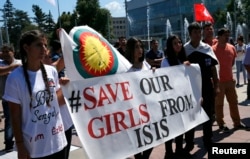Thousands of displaced Yazidis in the Sinjar mountains in Northern Iraq are still suffering and afraid, almost four years after Islamic State attacked Yazidi villages.
"The situation of the Yazidis in Iraq is of great concern. It is an ongoing humanitarian catastrophe with still close to 400,000 internally displaced scattered throughout the provinces of northern Iraq," Lisa Miara, founder of Springs of Hope Foundation, told VOA.
Miara said three-and-a-half years after the Yazidi genocide, some villages are still unreachable and no major effort has been made to enable thousands of Yazidis to restore their lives and businesses.
Yazidis, an ethno-religious minority group of about 550,000 people, mostly reside in northern Iraq, in an area also populated by Kurds and Arabs.
In August 2014, the Islamic State attacked the Yazidi-populated Sinjar mountain, killing thousands of men and taking thousands of women and girls as sex slaves. Yazidis consider the attack one of 74 genocides in their history.
The massacre against Yazidis was one of the reasons the U.S.-led military operation, under the authority of President Barack Obama, targeted Islamic State in Iraq in August 2014, the first offensive action by the U.S. in Iraq since it withdrew ground troops in 2011.
"Targeted airstrikes to protect our American personnel, and a humanitarian effort to help save thousands of Iraqi civilians who are trapped on a mountain without food and water and facing almost certain death," Obama said at the time.
Humanitarian aid
Given the large-scale humanitarian demand among displaced Yazidis, a number of local and global organizations are pleading to remain focused on the plight of the Yazidis.
Saad Babir, communication manager at Yazda Organization, told VOA that basic needs such as electricity, water and education are lacking. In addition, more than 70 percent of houses have been destroyed, and many religious temples targeted by IS are in rubble.
Thousands of Yazidi women kidnapped by IS are still missing. After the defeat of IS in Iraq and Syria, Yazidis feel they have been marginalized and efforts to find the girls — missing since 2014 — have receded.
"More than 3,000 women, men and children are still missing. Once IS was gone, no more attention is paid for the victims, no post-IS rehabilitation for the victims, and not just for Yazidis but everyone affected by ISIS," said Babir, using an acronym for the group.
Reconciliation
Babir said the atrocities committed by IS have created mistrust in the region between minorities and their communities in general.
USAID and the United Nations Development Program (UNDP) are working jointly on the recovery of minority groups.
"One thing we are doing is working to help restore some of the cultural diversity that has been a hallmark in Iraq," USAID's Mark Green, the United States' top foreign aid official, said at United States Institute of Peace last week.
"In northern Iraq, we have been helping Yazidis and Christian minorities to be able to return home, to feel secure enough to be able to re-establish their communities," Green said.






